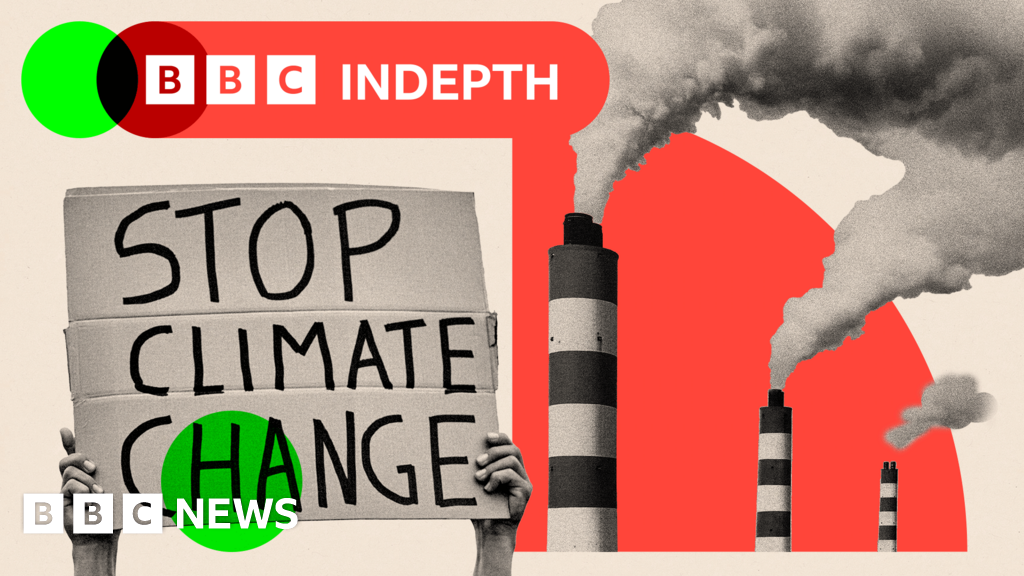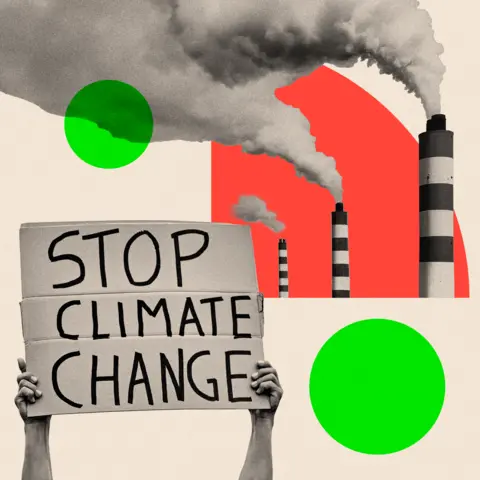 BBC
BBCThe WhatsApp message was from the chief negotiator of one of the most powerful countries at the COP climate gathering. Could I stop by for a chat, he asked.
As his team hunched over computers eating takeaway pizza, he raged about the obstructionist behaviour of many of the other teams at the conference.
So far, so normal. Others had been saying versions of this all week – that this was the worst COP ever; that negotiating texts, which are meant to get smaller as deadlines approached, were in fact ballooning; that COP in its current form might be dead in the water…
Looming over it all was the prospect of US president-elect Donald Trump withdrawing the US from the COP process when he takes office for a second time. He has called climate action a “scam” and, at his victory celebration in West Palm Beach earlier this month, vowed to boost US oil production beyond its current record levels, saying, “We have more liquid gold than any country in the world”.
But there was one positive: China.
“It’s the only bright spot in all of this is,” the chief negotiator told me. Not only was its negotiating style markedly different to previous years, but he also observed that, as he puts it, “China could be stepping forward.”
So what would it mean for the global effort to tackle climate change if it does step to the fore, just as the US steps back?
Negotiating styles – a change of tack
In the past, China has played a dual role in these talks. Sometimes it has aligned with the US and Europe, for example on ambitious targets to boost renewable power or on the reduction of methane, a potent greenhouse gas. On other issues, meanwhile, it has slowed progress.
One such example was COP15, which was held in Copenhagen in 2009. There had been high hopes that an agreement would be reached to commit countries to deep cuts in carbon emissions. But the conference nearly collapsed when China fought against US pressure to submit to a regime of international monitoring. The final non-binding deal was generally considered a failure.
This year was different. The chief negotiator I spoke to said that China was being “unusually cooperative” across all the discussions.
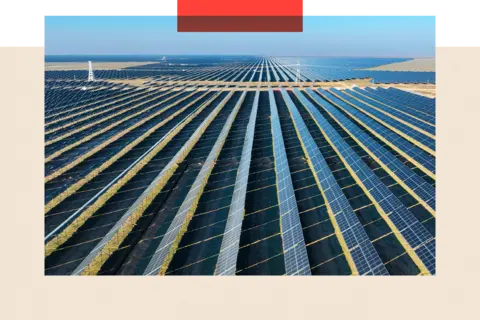 Getty Images
Getty ImagesThe most obvious sign of this came at the start of the conference, when China made public details of its climate funding.
Traditionally, China has released minimal information about its climate policies and plans, so it came as a surprise when this year, for the first time, officials said they have paid developing countries more than $24 billion for climate action since 2016.
“That’s serious money, almost nobody else is at that level,” one COP insider told me.
This got the conference buzzing. It is a “notable signal”, says Li Shuo, a director of China Climate Hub, “as it’s the first time that the Chinese government has laid out a clear figure in terms of how much they have been providing.”
Developing country vs superpower
China is classed as a developing country in the context of UN climate talks, despite being the world’s second biggest economy, the result of a peculiarity in the COP rules. (This is linked to its economic status in 1992 when the talks process began.)
It has long resisted pressure from developed countries to change its status, meaning it doesn’t have to contribute to the pot that rich countries have agreed to pay to poorer ones.
That pot has been one of the focuses in the talks at Baku. It totals $100 billion a year currently, but developing countries – those with low and middle incomes – need at least a trillion dollars a year to help them switch to clean energy and deal with the effects of climate change, according to the World Economic Forum.
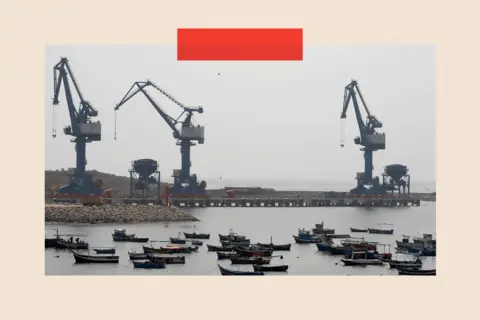 Getty Images
Getty ImagesWhat form that funding takes is another question, as little data is available. What is known is that Chinese money is helping to fund projects like solar farms and energy efficient lighting in certain developing countries such as Rwanda, where Chinese manufactured electric buses have been used in the capital Kigali.
“What’s so interesting is the language the Chinese used,” says Professor Michael Jacobs, an expert on climate politics at Sheffield University. “They described it as ‘provided and mobilised’ – that’s the term developed countries use for their payments.”
Language matters at climate conferences. Negotiators can spend days discussing whether something “should” or “will” happen. So, the Chinese echoing the language of the rich world is significant, Prof Jacobs argues.
“They used to calibrate everything against what the US did,” he says. When Trump took office in 2016, China stood back from the talks in response. This time is different, according to Prof Jacobs.
“This looks to me like a claim of leadership.”
What’s in it for the East?
“This isn’t [driven by] altruism on China’s part,” Prof Jacobs continues.
According to Li Shuo, the shifting economics of renewables explains why China is likely to be a bigger player.
“The green transformation is very much being led by China – not necessarily the government, but its private sector and companies”. These companies lead the rest of the world by what Li Shuo says is a “very significant margin”.
Eight out of every ten solar panels are made in China, and it controls some two-thirds of wind turbine production. It is reckoned to produce at least three-quarters of the world’s lithium batteries and more than 60% of the global market for electric vehicles.
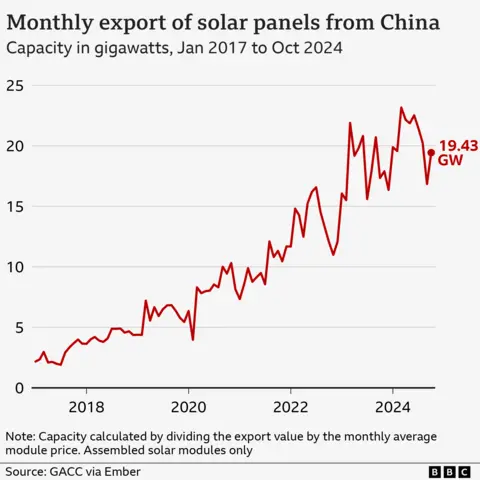
Earlier this year, Chinese President Xi Jinping said that solar panels, EVs and batteries are the “new trio” at the heart of the Chinese economy.
It is the huge investments China has made in renewable technologies and the massive economies of scale that it has created that have also driven down renewable costs year after year – the challenge it faces now is finding new markets to sell it into.
The developing world is where the demand is set to boom. These countries will account for two-thirds of the renewable market within 10 years, according to a recent report by a group of economists tasked by the UN with calculating the costs of the energy transition.
Pakistan imported 13 gigawatts (GW) of solar panels in the first six months of this year alone, according to research by Bloomberg NEF. To put that in context, the UK has 17GW of installed solar.
 Getty Images
Getty ImagesShipping clean tech to emerging economies dovetails with another of China’s policies: its “Belt and Road Initiative,” an effort to develop new trade routes, including roads, railways, ports and airports, to connect with the rest of the world.
China has spent more than a trillion dollars on the project, according to the World Economic Forum. Last week, President Xi opened a new port on the coast of Peru.
Which begins to explain why, as Prof Jacobs sees it, while the US may withdraw, China looks like it might be stepping up. “It now sees its best interest as encouraging other countries to also cut their emissions by using Chinese technologies and equipment.”
A tectonic shift in climate talks
If China does take a more central role, it would mark a tectonic shift in the COP process. Historically, Western countries – particularly the US and EU – have provided the momentum, cheered on by smaller climate-vulnerable nations. The difference in the way the talks play out will be marked.
Jonathan Pershing, program director of environment at the William and Flora Hewlett Foundation, has been to every COP and understands better than most the behind-the-scenes bartering, bullying and brinkmanship that makes or breaks deals at summits. He says that China won’t lead from the front, like the US and Europe.
“They’re more cautious players than that. It may be that they’re leading with Chinese characteristics, which is what they might say themselves.”
(This echoes how Deng Xiaoping, president in the early 1980s, described his economic reforms, which catapulted the country’s economic growth into double figures: “socialism with Chinese characteristics”.)
Pershing suggests that China is likely to help drive the COP process forward by discreetly intervening to unblock disputes. Most of this effort will take place behind closed doors, he believes, but is likely to include urging developing and developed countries to increase their ambition – and the flow of cash.
However China may not be entirely helpful on some of the challenges that slow the process, such as instances when countries use COP as a stage to champion their own interests.
One of the biggest blockers in Baku was said to be Saudi Arabia, which heads up a group of fossil fuel producing countries that want to slow the transition to renewables. As a big consumer of fossil fuels, China has often thrown its weight behind them in the past, such as by resisting the UK’s effort to get agreement to phase out coal at COP26 in Glasgow.
Ultimately, though, there is cause for hope, according to some well-placed observers. Camilla Born, who has been part of the UK’s negotiating team and helped run COP26 in Glasgow, believes that the future talks will be determined by the new economics of energy, not the politics of meetings.
“This isn’t just about an idea of how to deal with climate change anymore,” she argues. “This is about investments, about money – it’s people’s jobs, it’s new technologies. The conversations are different.”
It is, after all, the biggest revolution in energy since the start of the industrial revolution. And regardless of which superpower takes the lead, or if the US is out of the game for four years, it’s unlikely that anyone will want to miss out on such a vast market.
BBC InDepth is the new home on the website and app for the best analysis and expertise from our top journalists. Under a distinctive new brand, we’ll bring you fresh perspectives that challenge assumptions, and deep reporting on the biggest issues to help you make sense of a complex world. And we’ll be showcasing thought-provoking content from across BBC Sounds and iPlayer too. We’re starting small but thinking big, and we want to know what you think – you can send us your feedback by clicking on the button below.
